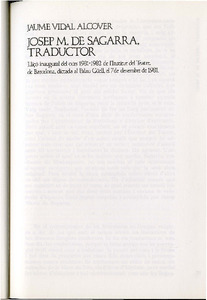| dc.description.abstract | <p>The translation of a language into another one has always pursued the aim to incorporate, for whatever reason it may be, a work belonging to a certain language and culture into the translator's language and culture; the accuracy with which this task is done has changed a great deal in the course of the centuries: it has become more rigorous eventually, so that this excess of rigour has ended up by ruining the translator's normal purposes, that's to say, to get either .the readers or the audience to understand the work's deep, last content. Josep M. de Sagarra's sensibility has understood from the beginning the risk of reaching this extremity; his translations of Shakespeare are a real Catalanisation of this English playwright, without betraying at all his thought, but making it suitable for our country's scenery. That is what the analysed fragments show, specially the difficult version of <em>Mistress Mine </em>from the <em>Magi's </em><em>Night. </em>A perfect fluency in Catalan, both in prose and verse, has been the tool which has enabled Sagarra to carry out his task with absolute guarantee of success, and so has been proved by the performance of any of his versions of Shakespeare.</p> | |


